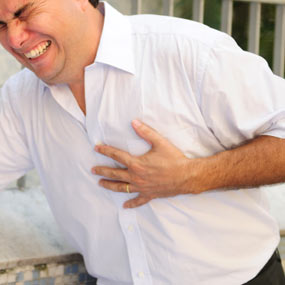 A heart attack is a medical emergency. If you have symptoms of a heart attack, call 911 or your local emergency number right away.
A heart attack is a medical emergency. If you have symptoms of a heart attack, call 911 or your local emergency number right away.
- DO NOT try to drive yourself to the hospital.
- DO NOT WAIT. You are at greatest risk of sudden death in the early hours of a heart attack.
Chest pain is the most common symptom of a heart attack. You may feel the pain in only one part of your body, or it may move from your chest to your arms, shoulder, neck, teeth, jaw, belly area, or back. The pain can be severe or mild. It can feel like:
- A tight band around the chest
- Bad indigestion
- Something heavy sitting on your chest
- Squeezing or heavy pressure
The pain usually lasts longer than 20 minutes. Rest and a medicine called nitroglycerin may not completely relieve the pain of a heart attack. Symptoms may also go away and come back. Other symptoms of a heart attack can include:
- Anxiety
- Cough
- Fainting
- Light-headedness, dizziness
- Nausea or vomiting
- Palpitations (feeling like your heart is beating too fast or irregularly)
- Shortness of breath
- Sweating, which may be very heavy
Some people (the elderly, people with diabetes, and women) may have little or no chest pain. Or, they may have unusual symptoms (shortness of breath, fatigue, and weakness). A “silent heart attack” is a heart attack with no symptoms.
